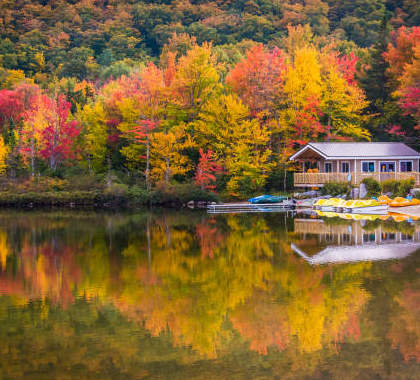Cities in New Hampshire - Quick Facts, History & Geography
New Hampshire Quick Facts
The state nickname of New Hampshire is the "Granite State" due to its abundant granite formations and historical significance as a major granite producer. New Hampshire became the 9th state to join the United States on June 21, 1788. The capital city of New Hampshire is Concord, which is the state's third-largest city. The largest city by population in New Hampshire is Manchester with a population of only 112,441 people. There are only 5 cities in New Hampshire, but there are 221 towns and 25 unincorporated places. New Hampshire is the 5th smallest state, with a land area of only 9,349 square miles. New Hampshire is 4.24% water and forested areas cover more than 81% of all New Hampshire land. The first primary of every election is held in New Hampshire. Chicken tenders came from the Puritan Backroom in Manchester, back in 1974. The McDonald's brothers Richard and Mac were born in Manchester. New Hampshire does not charge any sales tax. The town of Peterborough is home to the first public library in the United States. New Hampshire is famous for its picturesque covered bridges, some of which date back to the 19th century, adding to the state's rustic charm. The state motto of New Hampshire is "Live Free or Die," reflecting the independent and liberty-loving spirit of its residents. Famous people born in the state include Mandy Moore, Sarah Silverman, Adam Sandler, Seth Meyers, Alan Shepard, Sam Huntington, Carlton Fisk and Franklin Pierce.
The History of New Hampshire
Before European settlers arrived, various Native American tribes, including the Abenaki, Pennacook, and Piscataqua, inhabited the region now known as New Hampshire. The first European settlement in New Hampshire was established in 1623 at the town of Little Harbor (now part of Portsmouth) by English fishermen and entrepreneurs. New Hampshire was initially part of the Massachusetts Bay Colony but gained its separate identity in 1679 when King Charles II made it a separate royal province. It remained a royal province until the American Revolution. In the 18th century, New Hampshire's economy flourished through industries like lumber, fishing, shipbuilding, and trade. In 1774, it held its own Provincial Congress and became one of the first colonies to establish a government independent of British control. In the 19th century, New Hampshire became known for its abolitionist sentiments and active participation in the Underground Railroad, helping enslaved people escape to freedom. In the 19th century, New Hampshire experienced significant industrialization, particularly in the textile industry. In the 20th century, New Hampshire's economy shifted from traditional industries to a more diverse economy, including tourism, high-tech manufacturing, and education.
The Geography of New Hampshire
The picturesque geography of New Hampshire includes mountains, lakes, rivers, forests and a short but scenic coastline along the Atlantic Ocean. New Hampshire is bordered by Vermont, Massachusetts and Maine. The White Mountains, located in the northern part of the state, are a prominent mountain range known for having the highest peak in the Northeastern United States, offering breathtaking views and challenging hiking trails. Central New Hampshire is home to the Lakes Region, characterized by numerous pristine lakes, including the famous Lake Winnipesaukee. In the southeastern part of the state lies the Seacoast Region, which boasts a picturesque coastline along the Atlantic Ocean. Along the western border of New Hampshire runs the Connecticut River, which serves as a natural boundary with the state of Vermont. The Merrimack River, the longest river in New Hampshire, flows through the southern part of the state. New Hampshire boasts several state parks and protected areas that preserve its natural beauty and offer recreational opportunities. Notable parks include Franconia Notch State Park, Crawford Notch State Park, and Pawtuckaway State Park.
New Hampshire Relocation Guide
New Hampshire is one state where you can encounter many different things depending upon which part of the state you are in. In the top part of New Hampshire, there are the White Mountains and all of the things that go along with mountain life. Meanwhile, New Hampshire also has some shore line with the Atlantic Ocean, offering beach-goers a chance to enjoy the sun and the sandy beach. In general, these are considered the touristy areas, with skiers coming to the north and beach lovers heading south. Additionally, some of the areas bordering the state of Maine are popular, with lots of great restaurants and bed and breakfast resorts there.
While the weather in New Hampshire can be rather harsh during the winter months, it can also be quite pleasant during the summer. Folks enjoy New Hampshire for vacation, similar to how they flock to Maine. One reason that it is nice to relocate to New Hampshire is that they do not charge sales tax, so the cost of living is significant reduced. There are also some really nice housing opportunities available to those people who are looking for real estate.
Cities in New Hampshire offer some of the lowest crime rates across all of America, at almost 50% less than the national average. Even larger cities like Nashua are considered a very safe place to live, which is rare for a city of that size.

